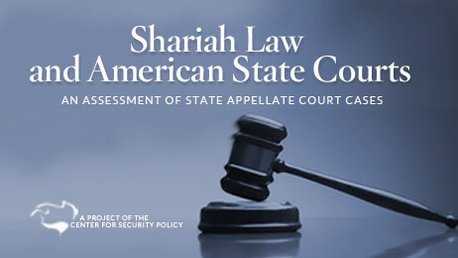Shariah Law and American State Courts: An Assessment of State Appellate Court Cases
This study evaluates published appellate legal cases that involved “conflict of law” issues between Shariah (Islamic law) and American state law.

Introduction
Purview
This study evaluates published appellate legal cases that involved “conflict of law” issues between Shariah (Islamic law) and American state law. For every case in this sample drawn from published appellate legal cases, there are innumerable cases at the trial level that remain unnoticed except by the participants. Thus, this report is a only a sample of possible cases—a “tip of the iceberg”—of legal cases involving Shariah in local, state and federal courts.
Our findings suggest that Shariah law has entered into state court decisions, in conflict with the Constitution and state public policy. Some commentators have said there are no more than one or two cases of Shariah law in U.S. state court cases; yet we found 50 significant cases just from the small sample of appellate published cases. Others state with certainty that state court judges will always reject any foreign law, including Shariah law, when it conflicts with the Constitution or state public policy; yet we found 15 Trial Court cases, and 12 Appellate Court cases, where Shariah was found to be applicable in the case at bar. The facts are the facts: some judges are making decisions deferring to Shariah law even when those decisions conflict with Constitutional protections. This is a serious issue and should be a subject of public debate and engagement by policymakers.
Purpose
With the publication of this study and subsequent studies now in preparation, our objective is to encourage an informed, serious and civil public debate and policymakers’ engagement with the issue of Shariah law in the United States of America. This public debate is more urgent than ever before, as organizations such as the Muslim Brotherhood and their
salafist coalition partners state openly their intent to impose the Shariah State and Shariah law as dominant across all Muslim majority countries. Institutionalized, authoritative Shariah doctrine is comprehensive and by definition without limit in its ambitions and scope. It includes legally mandated, recommended, permitted, discouraged and prohibited practices that are explicitly biased against women, homosexuals, non-Muslims, former Muslims and those designated as blasphemers.
United States universities and colleges are increasingly offering courses and specializations In Shariah law, including business schools, law schools and general courses. The academic study of all kinds of comparative law including Shariah is worthwhile; but in many cases, these courses may not provide full information on the conflicts between Shariah and Western legal traditions and values.
In addition, there are organizations and individuals within the United States actively and openly advocating for the establishment of Shariah law in America, especially for personal status and family law. A prominent one is the Assembly of Muslim Jurists of America1 with more than 100 members including local Imams and Shariah authorities across America, as well as Shariah authorities from other countries. AMJA promotes the adherence to Shariah law when possible in all legal and civic activities by Muslim Americans, and in some cases, by non-Muslims.
Given these stated goals of AMJA and similar organizations, this study was conducted to discover the extent to which Shariah law had in fact entered U.S. state courts. News reports have identified individual cases of plaintiffs, defendants or judges citing Shariah or Islamic law. Many groups and individuals have raised concerns about state courts citing foreign and transnationalist laws and precedents, including Shariah law. The American Public Policy Alliance, a non-partisan organization that advocates for the Constitutionality of U.S. and state laws and public policies, has drafted the American Laws for American Courts Act (ALAC) to prevent enforcement of foreign legal decisions that violate Constitutional protections and liberties. That ALAC Act, which has passed in Tennessee, Louisiana and Arizona and to date has not been legally challenged on any grounds, was used as a methodological tool to define which Shariah-related cases in state courts were in conflict with the Constitution or state public policies.
1 Andrew Bostom and Al-Mutarjim, “Chairman King: Subpoena the Assembly of Muslim Jurists of America,” Pajamas Media, March 1, 2011. https://pajamasmedia.com/blog/congressman-king-subpoena-the-assembly-of-muslim-jurists-of-america-amja/
- LIVE NOW – Weaponization of US Government Symposium - April 9, 2024
- CSP author of “Big Intel” is American Thought Leaders guest on Epoch TV - February 23, 2024
- Four weeks after release, Big Intel remains a #1 Amazon bestseller - February 13, 2024
